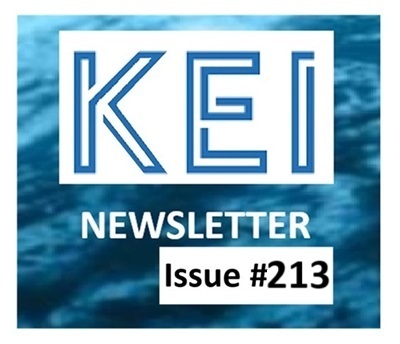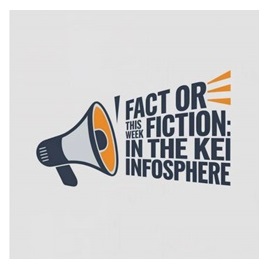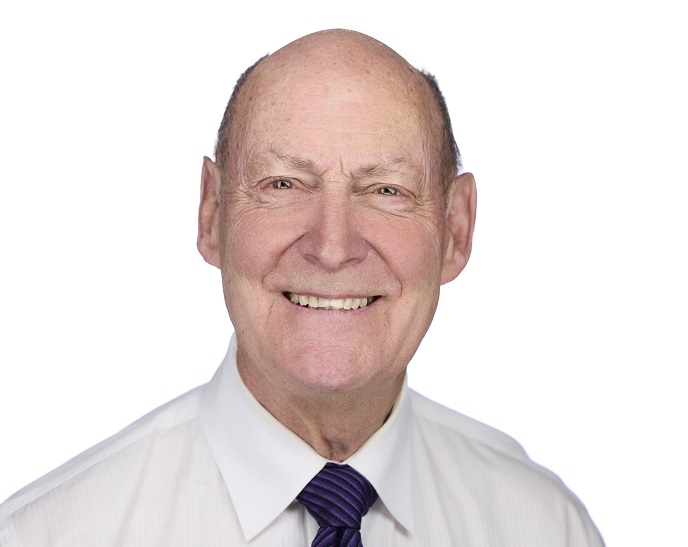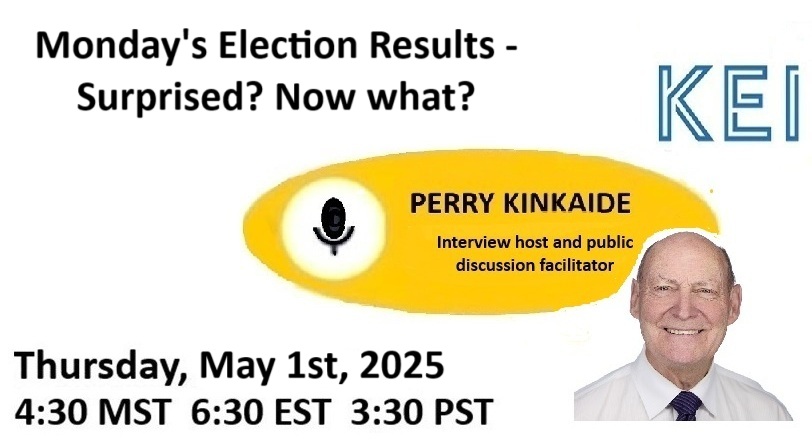|
Change is Inevitable - Leadership is Not |
DIRECTORY | ||
|
Contributions: Populism, Power, and the Appeal of the Strongman |
Action: Help sustain KEI's contributions |
Fact or Fiction?
The Green Dream |
|
|
Editor - Perry Kinkaide |
We live in an age of contradictions. We demand change, yet cling to security. But change is no longer optional — it’s here, accelerating faster than most dare to admit. Across the globe leadership is strained: migration surges, economies falter, markets wobble, technology outpaces governance, and populism rises. Canada, too, stands at a decisive crossroads. Years of focusing on social engineering over economic stewardship have left our foundations exposed. A recent assessment of Canada's future HERE paints a grim picture: stagnation, division, and squandered opportunity for a nation once bursting with promise.
Canadians face a stark choice in Monday's election. Not between personalities, but between denial and truth, slogans and substance. Leadership now demands courage — not the easy comfort of promises, but the hard work of preparing the country for what lies ahead. Hope is not enough. Sentimentality is not leadership. It is time for sober action, grounded in integrity and foresight. Today's newsletter features two articles that dive deeper into the urgent choices before us: Integrity’s Role in Canada's Coming Transition and The Price of Abandonment: Trust, Power, and the Erosion of Dollar Dominance. - Editor |
||
Integrity’s Role in Canada's Coming TransitionThere was a time — at least in the fairy tales we tell ourselves — when a politician’s word was their bond, when public life demanded personal integrity, not merely the performance of it. Today, as Canada stands on the brink of an election that could chart its course toward uncertainty, the notion seems almost laughable. Politics and integrity are now treated as distant cousins, awkwardly waving at each other across a chasm built of ambition, compromise, and raw pursuit of power. But this time, the stakes are greater than another electoral cycle. This time, the stakes are the very structure of Canada itself.
The signs are impossible to ignore: a staggering federal debt that no one dares seriously confront, a widening schism between resource-producing provinces and the political centre, rising alienation in the West, simmering resentment in Quebec, and the slow erosion of trust in national institutions. A growing number of Canadians quietly admit: the Confederation built in 1867 may no longer be sustainable in its current form.
Integrity demands we acknowledge this reality — not with panic, not with anger, but with courage and clarity. A country cannot be held together by deception. The task ahead may not be to "save" Canada as it has been, but to manage its transformation — through reason rather than passion, through lawful process rather than violence, and through leadership that places the long-term good ahead of short-term gain.
History offers rare examples of leaders who rose to such moments with integrity. Winston Churchill, confronting Britain’s possible annihilation, spoke plainly to his people: "We have before us many, many long months of struggle and of suffering." He did not offer illusions, but a call to endurance and unity in the face of grim realities. Continued below
No need to register. Just click here https://us02web.zoom.us/j/84258596166?pw.. Continued from above. Abraham Lincoln faced America’s bloody fracture with eyes open. His presidency was not about pretending unity could be easily restored — it was about preserving, through sacrifice, the deeper principles that could justify a nation’s existence.
Pierre Trudeau, Canada's charismatic and controversial Prime Minister, saw the country strained by centrifugal forces. "Reason over passion," he famously insisted, even as he invoked extraordinary measures during the October Crisis to prevent disintegration. Trudeau understood that unity could not survive on sentiment alone; it required constitutional, rational foundations.
Preston Manning, founder of Canada's Reform Party, anticipated today’s crisis. He warned that ignoring regional discontent and eroding political ethics would corrode national solidarity. "If the means used to gain or maintain power are unethical, the power itself becomes corrupt," he said. Manning’s career was an unfinished project, but his vision — that only integrity could renew Canada's political order — remains crucial.
Today, Manning’s warning resounds louder than ever. The forces pulling Canada apart are not temporary grievances but structural fractures. Political leaders who paper over the cracks with easy slogans and cheap promises will not preserve unity — they will only hasten its collapse.
The political class has convinced itself — and increasingly convinced Canadians — that integrity is a luxury. That telling the people hard truths would be political suicide.
But if that is true, then Canada’s political suicide is already underway.
In this moment, the leader with integrity is not the one who promises to save the past. It is the one who prepares the country for an orderly, peaceful transition to whatever comes next.
One who will tell Canadians the truth about the unsustainable tensions we face. One who will work to prevent bitterness, violence, and chaos from filling the void that broken trust leaves behind. This election, Canadians are not merely choosing a Prime Minister. They are choosing whether to insist on honest leadership for what may be the most difficult passage in our history.
Power is intoxicating. The temptation to deny reality in exchange for a few more years of political survival is overwhelming. But history is clear: nations facing existential change survive best when led, not by opportunists, but by men and women of principle. The last honest man — or woman — will not promise easy unity. They will promise only this: reason instead of rage, process instead of violence, dignity instead of delusion.
In the end, they are the only ones who can guide Canada through what lies ahead — whatever that may be. The Price of Abandonment: Trust, Power, and the Erosion of Dollar DominanceA moment of recalibration is upon us—economically, geopolitically, and psychologically. The world is not merely watching America; it’s reconsidering it. Trust, once implicit in the U.S.-led global order, is now a currency in free fall. And the repercussions are not confined to Washington—they ripple across Ottawa, Beijing, Brussels, and beyond.
The argument that America is too stretched, too embattled, and too distracted to sustain global leadership is gaining ground—not because it’s wrong, but because it feels real. Domestic fragilities—stagnant wages, political gridlock, widening inequality—fuel a narrative of withdrawal. Yet the costs of stepping back are far greater than the burdens of staying engaged.
American global leadership was never about altruism; it was about leverage. Post-WWII institutions amplified U.S. economic power, cultural dominance, and military deterrence. The dollar emerged not just as a unit of exchange, but as the world’s financial anchor. Retreat now is not prudence—it’s a forfeiture of that leverage. What’s shifting is not American capacity, but American coherence. Ideological trench warfare, short-term populism, and performative politics have eroded the credibility that once underpinned U.S. power. And financial markets are reacting—not with panic, but with pragmatism.
Gold and bitcoin are surging not because investors are greedy, but because they’re wary. As Mike Novogratz aptly observed, “Bitcoin and gold are report cards on financial stewardship.” The grades are coming in—and they’re not flattering. The erosion of the U.S. dollar’s dominance is no longer a fringe theory. It’s unfolding in real time. Central banks are diversifying. Allies are exploring alternate payment systems. Even private capital is retreating to historically cautious havens like the Swiss franc and bullion. In an era when fiscal brinkmanship dominates headlines, and monetary messaging falters, trust—not liquidity—is the scarcest resource.
Canada at the Crossroads. Nowhere is this more consequential than in Canada. Economically entwined with its southern neighbor, Canada finds itself both buoyed and burdened by the dollar’s decline. A weakening greenback may boost Canadian exports in the short term, offering a competitive tailwind to the loonie. But the longer-term outlook is fraught.
If American credibility continues to erode, the loonie—by proximity—could suffer reputational collateral damage. Foreign investors may struggle to distinguish between policy dysfunction in Washington and fiscal prudence in Ottawa.
That’s why Canada’s 2025 federal election carries more than domestic weight. It is a referendum not only on leadership and policy but on the international credibility of Canadian governance. A government that demonstrates discipline, transparency, and economic foresight could help position the loonie as a North American hedge—an island of stability in an unsettled continent.
But this opportunity must be seized, not assumed. Political incoherence, deficit indiscipline, or a lack of strategic ambition could just as easily tie the loonie’s fate more tightly to a faltering dollar.
The Test of the Era. Currencies are mirrors. They reflect a nation’s intentions, its institutions, and the world’s confidence in both. As the U.S. dollar’s supremacy becomes less automatic, countries that project clarity and competence will rise in relevance. Those that do not will drift, or worse—be swept aside in the shifting tides of global trust.
The tragedy is not that the U.S. can’t lead. It’s that it might choose not to. And the danger is not only American—but shared by all who depend on a stable, rules-based international system.
If we are entering a post-dollar world, the measure of national strength will be credibility. Not how loudly one shouts, but how firmly one stands. And in that recalibrated reality, both America and Canada must decide: will they retreat—or rise?
Because in the economy of trust, the only reserve currency that counts is credibility.
Editor@KEInetwork.net |



